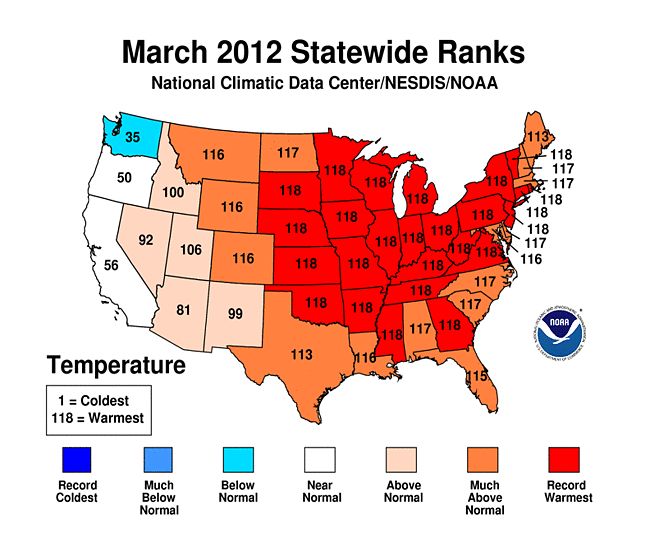Warmest Winter on Record: A Look At the Effects

This winter has been characterized by warmer-than-average temperatures for much of the United States. Warmer winter temperatures may have seemed a welcome change from recent extremely cold weather, such as the record breaking winter of 2010, but what are the effects of these abnormal temperatures on climate and wildlife?
According to the National Oceanic and Atmospheric Administration,
“Every state in the nation experienced at least one record warm daily temperature during March.”
The administration reports that over 15,000 temperature records were broken last month, with every state in the lower 48 experiencing at least one record high temperature.
For 25 states east of the Rockies, last March was the warmest ever recorded. These states also experienced their warmest first quarter on record. The persistent weather pattern which caused such warm temperatures in the east also created cooler-than-average temperatures for the West Coast states of Washington, Oregon, and California.
Such extremes have created conditions favorable to thunderstorms and tornadoes. According to the NOAA, March, on average, experiences 80 tornadoes. This year there were 223 tornado reports in the month of March.
Last weekend alone, over 100 tornadoes touched down in several of the Plains states, all occurring in a 24 hour period. This is more than the number of tornadoes normally expected for the entire month of April. This weekend’s storms caused 6 fatalities, far less than the 40 fatalities caused by tornadoes in March.
Aside from economically and environmentally devastating tornadoes, warmer temperatures are having an increasingly devastating effect on wildlife. A study put out last month by the National Wildlife Federation explores how this year’s warm winter kept wildlife confined to higher elevations and northern breading grounds. This made last year’s hunting and fishing season nearly non-existent in the Northern United States. In the report, fishermen and hunters explain changes they have seen in wildlife from the ground.
The National Wildlife Federation uses such sports-persons because they offer valuable experience in closely observing the behavior of certain wildlife year after year. In fact fishermen and hunters, while often criticized by those opposed to the killing of animals for sport or food, consider themselves to be conservationists. Fishermen lobbied Congress and the Environmental Protection Agency last year on behalf of protecting rivers and fish from mercury emissions from power plants. Mercury poisoning has a much greater effect on the environment, wildlife, and humans, than fishing for sport in rivers across the country. Needless to say, ice fishing was less abundantly accessible this winter than in past years.
Another immediate and drastic result of the warm winter has effected the slightly awkward yet imposing half-ton Moose. Moose are dying in much larger numbers this year than normal because of ticks. According to the study,
“In a normal year, a moose may carry 30,000 ticks. But in years such as this, with warm winters and late snowfalls, that number can explode to 160,000 ticks per moose.”
Cold weather is key in keeping down tick population, and without freezing temperatures their population has exploded. Many outdoors-men say that the current tick problem is the worst they have ever seen.
The NWF states in the conclusion of their study, “The 2011-2012 “winter that wasn’t” in North America is an indication of our future. As we continue to spew carbon pollution into the atmosphere, we are exacerbating global warming and ensuring that cold, snowy winters will become less frequent.” Whether or not this winter this is an indication of upcoming immediate and prolonged warming trends, it remains to be seen what the further effects and severity of the past several warm months might be.





